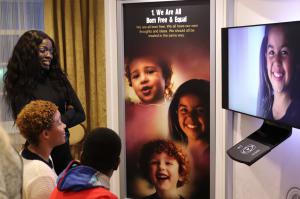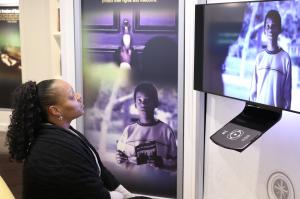Is There Hope for 2019? Bringing Human Rights Education Can Make a Difference
Understanding your basic human rights is vital. How can you keep your rights from being abused if you don’t know what the 30 human rights are?”
WASHINGTON, DC, USA, December 28, 2018 /EINPresswire.com/ -- No doubt about it, human rights have become a more pressing issue in recent months. According to personal surveys there is an estimate of more than 89% of the American population having little to no knowledge of what their basic human rights are. It is no wonder thus that human rights abuses still occur within the United States.— Erica Rodgers
As we contemplate the New Year and celebrate the holidays it is important to remember that the cheer of the holiday season is lost for many populations, be it the Rohingya people, the Uyghurs or the situation of human rights defenders in many countries, including the United States. The only hope for bringing change as we start fresh in the new year is to broadly implement human rights education.
On December 10, 1948, the United Nations adopted the Universal Declaration of Human Rights with the intention that every individual and every organ of society would be teaching and educating everyone on the principles enshrined in the document thereby bringing a culture of respect for human rights. The United Nations’ goal was to create peace and security amongst all countries of the world through this education on human rights. Although progress has been made with regard to human rights issues across the country, there is much still to do.
To celebrate the 70th Anniversary of the United Nations Universal Declaration of Human Rights, Youth for Human Rights International created an interactive Pop-up Museum in Washington, DC. The museum showcased the history of human rights and celebrated the forward strides made to protect human rights everywhere in the last 70 years.
The museum also included a special section titled “Human Rights Heroes” where attendees of the pop-up museum were able to tour through displays featuring human rights activists who greatly contributed to forwarding human rights in their lifetimes. Some of the heroes featured included Eleanor Roosevelt, Martin Luther King Jr., Frederick Douglass, Nelson Mandela and Cesar Chavez.
Additionally, Peace Lights, an increasingly recognized international symbol of peace, played as visitors entered the Museum.
After the Pop-Up Museum’s first appearance during the International Day of Peace in September 2018, the exhibit was brought back by popular demand and expanded into a two-day exhibit. Erica Rodgers, the National Director of Youth for Human Rights International and organizer of the event said, “We wanted to create a museum that brought each one of the fundamental human rights to life in a way that allowed people to connect with what human rights mean to them and their lives.”
This two-day Pop-Up Museum remained busy throughout the day as people came to tour the series of exhibits spanning over ten-thousand square feet.
“Understanding your basic human rights is vital. How can you keep your rights from being abused if you don’t know what your 30 human rights are?” Rodgers explained.
The Pop-Up Museum was hosted by The Founding Church of Scientology at 1424 16th St. NW, Washington, DC as part of the Church’s ongoing support of Youth for Human Rights International’s initiative of broad human rights education in the community. When asked, “Why do Scientologists care so much about human rights?”, representative of the Church, Sylvia Stanard, had this to say: “Protecting the basic human rights of all people has been a part of the Church of Scientology’s core values since its founding in 1954. L. Ron Hubbard was a humanitarian and firm supporter of human rights as listed in the United Nations Universal Declaration of Human Rights. In 1969 he stated in a directive to the staff of Churches of Scientology around the world that, ‘Human Rights must be made a fact, not an idealistic dream.’ Therefore as a natural result, the Church of Scientology sponsors human rights campaigns such as Youth for Human Rights International to help fulfill Mr. Hubbard's vision of a better world where human rights are a living reality.”
About Youth for Human Rights:
Youth for Human Rights International (YHRI) is a nonprofit organization whose mission is to teach youth about human rights, specifically the United Nations Universal Declaration of Human Rights, and inspire them to become valuable advocates for tolerance and peace. YHRI teaches human rights education both in the classroom and in nontraditional educational settings such as through both regional and international youth summits, school lectures, art series, concerts and other interactive community events. Their most recent campaign has included #KnowYour30 with the purpose of increasing awareness of the 30 human rights every person has – and how they are a part of everyday life. To learn more go to https://www.youthforhumanrights.org or watch a documentary on how Youth for Human Rights began.
Erica Rodgers
Youth for Human Rights International - DC National Office
+1 202-667-6404
email us here
Visit us on social media:
Facebook
Twitter
LinkedIn
Legal Disclaimer:
EIN Presswire provides this news content "as is" without warranty of any kind. We do not accept any responsibility or liability for the accuracy, content, images, videos, licenses, completeness, legality, or reliability of the information contained in this article. If you have any complaints or copyright issues related to this article, kindly contact the author above.



